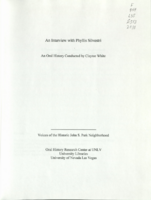Search the Special Collections and Archives Portal
Search Results

Transcript of interview with Murl Emery by James M. Greene, October 18, 1974
Date
Archival Collection
Description
On October 18, 1974, James M. Greene interviewed Murl Emery (born June 7th, 1903 in Bolton, California) at his home in Nelson, Nevada. Also present during the interview is Mrs. Emery and Mr. Dutch Eckhart, a guest who has just arrived to visit with Mr. Emery. The interview covers Mr. Emery’s personal experience in and around Southern Nevada, particularly in the areas from Searchlight, Nevada to Nelson, to Boulder Canyon, but mostly on the Colorado River. Mr. Eckhart also helps to interject some insight into the popularity of the Model T Ford in those days and early days of newly paved roads. Additionally, they discuss water shortage, wells, the building of the railroad, and mining in Nevada. Mr. Emery also discusses the books that were written about his adventurous life, his discoveries and his explorations.
Text

Transcript of interview with Doris Evans by Lance Kenny, March 12, 1977
Date
Archival Collection
Description
On March 12, 1977, Lance Kenny interviewed realtor, Doris Evans (born in Dexter, Missouri) at her place of business, Doris Evans Realty, located at 1100 Cahlan Drive, Las Vegas, Nevada. This interview covers Boulder City and Las Vegas [1937-1977]. During the interview Doris discusses real estate, local hotels, early transportation, and social recreation. She also mentions the nuclear tests, crime, environmental changes, and marriage and family life in Boulder City and Las Vegas. Doris’s business partner, Patty (Renette Beringer), is also present during the interview and helps Doris recall the year they started Doris Evans Realty in Las Vegas, Nevada.
Text

Transcript of interview with Phyllis Silvestri by Claytee White, January 11, 2010
Date
Archival Collection
Description
As a young woman, Phyllis Silvestri made the adventurous decision to move to the United States. She was bom in Canada and lived there until her early 20s. Over the next few years, Phyllis and her friend Mona logged many miles, worked and visited several states. By 1953, Phyllis had met and married Vincent Silvestri, who worked at Bingo Palace, now the Sahara Hotel and Casino. Soon they had their first child and had bought a home on Santa Rosa. A few years later they were building a new home in the John S. Park area. She proudly recalls her husband's attention to details such as including lots of built-in features and a bomb shelter that represents the era. Phyllis talks fondly of the neighborhood, but also recalls her children not being allowed to play with some of the neighborhood children because they were of Italian ancestry.
Text

Transcript of interview with Bud Weil by Claytee White, December 9, 2003
Date
Archival Collection
Description
Bud Weil worked as a disc jockey in Mexico after serving in the military during World War II. In 1947, he moved to Las Vegas to work at KLAS but after two days he was job hunting. His search landed him at KENO, a radio station owned by Max and Laura Belle Kelch. His was an interview show that afforded him entree to stars performing in town. The list of his favorite interviews includes Sophie Tucker, Sammy Davis, Jack Benny, The Mills Brother, Rosemary Clooney, Leno Home, Joey Lewis and many others. In 1955, he became restless, left the career in broadcasting, and joined Max Kelch as a partner in a new venture for Las Vegas - Musak. This enterprise took him to the doors of every business in town and shortly, he knew everybody. He uses that knowledge in this interview to talk about all aspects of life as the town grew over the years. Today he is a senior statesman of our town, enjoying everything about Las Vegas except the traffic.
Text

Transcript of interview with Cheryl Leonard by Claytee White, February 12, 2013
Date
Archival Collection
Description
First arriving in Las Vegas as an infant, Cheryl Leonard's young life included a brief sojourn in Southern California before returning to Las Vegas in 1954. After attending local elementary and middle schools, she started at Rancho High during the day, and working at the Huntridge theater in the evenings and during the summers. More than just work, though - in this interview, Cheryl recalls school activities from parades to pep club, participating in Helldorado, hanging out with her friends at the Blue Onion and shopping on Fremont Street. After graduation, Cheryl returned to California to attend school before coming back to Las Vegas and taking a job with the Central Telephone Company. This was followed by a brief stint working at the Nevada Test Site before she married in 1964 and concentrated on raising her own daughters in a rapidly growing and changing Las Vegas.
Text

Transcript of interview with Ann Lynch by Emily Powers, May 27, 2008
Date
Archival Collection
Description
Ann Lynch discusses her background - born in Kansas City, 1934; attended Baker University in Baldwin, Kansas; classes at Kansas University; a year in theater; director of PR at Evansville University. In 1959 she came to Las Vegas as director of the clubs at Nellis Air Force Base. Ann shares in depth on her parents and grandparents and on her family today, which includes a brother 14 years younger, her son, and a nephew. She describes Las Vegas in the early sixties, meeting her husband, and her duties as club manager at Nellis. She comments on becoming camp director for the Girl Scout program at Mount Charleston, which led to training scout leaders and board members. When Ann's son Edward went to kindergarten, she took on the PTA job of parliamentarian, then president of Ruth Fyfe ES PTA. She eventually became President of the Las Vegas Area Council, Nevada State PTA president, and finally national president of the PTA. The school named after her (Ann T. Lynch Elementary) has benefited from her other charity organizations. Because of her PTA involvement, Ann became very active in legislation in Washington, D.C., traveling to other countries to help activate parent involvement. She had also worked with Sunrise Hospital during this time and when she was relieved of some of her PTA duties, she helped found the Sunrise Hospital Children's Foundation and the Public Education Foundation. She details the many functions of both foundations. Ann comments on the lobbying she does in the Nevada legislature and in Washington, D.C., medical billing through Medicare and Medicaid, and the ongoing shortage of nurses nationwide. She offers opinions on unions for nurses and mentions robotic surgery, the stroke center, neonatal center, and breast cancer center as evidence of recent developments in medicine at Sunrise Hospital.
Text

Rosamond McDougal interview, February 14, 1979: transcript
Date
Archival Collection
Description
On February 14, 1979, Concepcion Fernandez interviewed Rosamond McDougal (born in Texas) about her life as a teacher in Las Vegas. McDougal speaks primarily about her time as a teacher in the Clark County School District, her unique class setup and the district’s changes. Moreover, McDougal speaks about the growing number of students and teachers, the superintendent’s role in bond issues, the courses offered, racial integration in the school district (and the casinos), and the building of the University of Nevada, Las Vegas. McDougal gives personal anecdotes about her family, her husband’s job at the Atomic Test Site and her time as an organ player in churches around the city. Lastly, she talks about recreational activities, Helldorado, the casinos and department stores.
Text

Interview with Cecil C. Garland, July 19, 2006
Date
Archival Collection
Description
Text

Interview with James Ogle, April 6, 2005
Date
Archival Collection
Description
Text
Transcript of bus tour of "Jewish Las Vegas" by Temple Beth Sholom, May 17, 2015
Date
Archival Collection
Description
Temple Beth Sholom organized and led a bus tour of parts of Las Vegas that are significant in local Jewish history. Stops on the tour included Woodlawn Cemetery and the former Temple Beth Sholom campus on Oakey Boulevard. Narrator Arlene Blut gives the overview of the Jewish community, and Rabbi Felipe Goodman talks to tour participants at the cemetery. Former Las Vegas mayor Oscar Goodman speaks at the old synagogue along with Josh Abbey, whose mother created the stained glass windows at the temple.
Text
